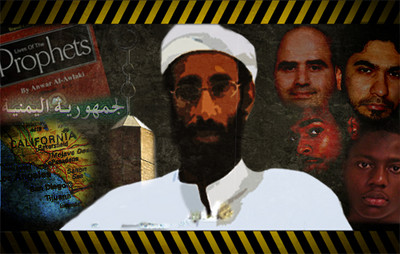IPT News September 30, 2011
 American-born al-Qaida cleric Anwar al-Awlaki was killed Friday by a U.S. airstrike in Yemen, administration officials say.
American-born al-Qaida cleric Anwar al-Awlaki was killed Friday by a U.S. airstrike in Yemen, administration officials say.
Awlaki, 40, was among the terrorist group's most charismatic figures, expanding al-Qaida's violent theology to a new pool of potential recruits by speaking and writing in English. He also was tied to a series of attacks, including the Fort Hood massacre and the attempted bombing of a Detroit-bound airliner on Christmas Day 2009. An Associated Press dispatch calls the strike "the biggest U.S. success in hitting al-Qaida's leadership since the May killing of Osama bin Laden in Pakistan."
He was the most visible figure in al-Qaida in the Arabian Peninsula, an al-Qaida affiliate considered the most dangerous and capable of carrying out terrorist attacks.
The strike hit a convoy carrying Awlaki and his bodyguards and may have been the result of cooperation from elements within Awlaki's own tribe.
"This is an extraordinary victory, a great moment for the United States. Al-Awlaki, has become more dangerous than bin Laden," U.S. Rep. Peter King, R-N.Y. and chairman of the House Homeland Security Committee, told Politico. "Over the last year, he's become the No. 1 terrorist in the world."
Another AP report indicates the attack killed a second American; former North Carolina resident Samir Khan, dealing a crushing blow to the al-Qaida affiliate's global recruiting operation. Khan published seven issues of Inspire magazine, the latest earlier this week. A slick publication with high quality graphics, Inspire offered a mix of articles glorifying jihad, offering religious justification for attacks and providing detailed instructions for "lone wolf" terrorists to wage attacks inside the United States.
A similar report of Awlaki's death in late 2009 turned out to be false. In this case, senior government officials have confirmed the attack and briefed congressional leaders like King. Officials also are hoping to match Awlaki's DNA with relatives still living in Virginia.
Before leaving America in 2002, Awlaki was considered a moderate voice. After the 9/11 attacks, National Public Radio cast him as someone who could "build bridges between Islam and the West," and a voice for moderation. He was even invited to give a presentation at the Pentagon in February 2002. But, as the Investigative Project on Terrorism reported last year, recorded sermons from that era show he already was spreading a radical message inside the United States.
For more on Awlaki's role as an inspiration to terrorists click here.
---30---